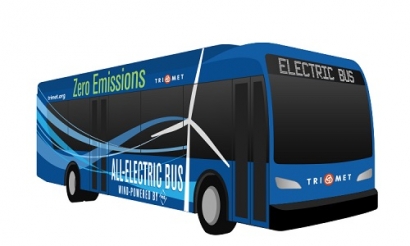
"Our first battery-electric bus – fueled by all wind power – is rolling into service, putting our agency and the region on the forefront of a cleaner future," said Doug Kelsey, TriMet's general manager. "This is just the beginning of the road as we transition from a diesel bus fleet to a green fleet."
Four of the e-buses were funded by a $3.4 million grant from the Federal Transit Administration (FTA) Low and No Emission Vehicle Deployment program and the fifth was purchased by TriMet and Portland General Electric.
The buses will run on Line 62-Murray Blvd in Beaverton. This route — which runs from 5 a.m. to 11 p.m., covers 13 miles and climbs nearly 700 feet in elevation — will allow these buses to be tested under tough, real-world conditions.
The new battery electric buses scored as the quietest buses ever in one Federal Transit Administration test. The amount of noise they make idling — about 39 decibels — is generally quieter than the ambient noise surrounding them.
The buses have a direct drive system; no transmission required. This saves weight and simplifies maintenance. They also feature regenerative braking, meaning every time these buses brake or decelerate, they charge their batteries.
ABB's electric vehicle (EV) charging infrastructure was selected to power the five e-buses.
"ABB is serious about tackling climate change and we are proud to be a part of TriMet's efforts to reduce the region's air pollution," said Stephanie Medeiros, ABB Electric Vehicle Infrastructure. "ABB will help the transit operator navigate the transition from fossil-fueled vehicles to electric ones by providing TriMet with the bus charging technology, including a 450 kW en-route interoperable opportunity charger and 150 kW sequential bus depot chargers in 2019."
.

